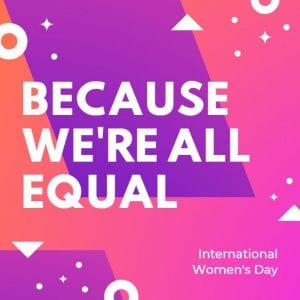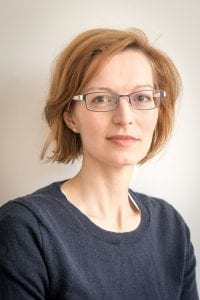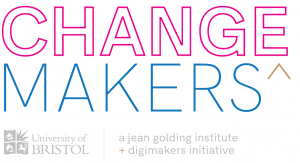
As part of the celebration of International Women’s Day on Friday 8 March 2019, the Jean Golding Institute will be launching a new blog series interviewing the people behind the Changemakers initiative – bringing hands-on STEM activities to young women.
In the first of this series, Data Scientist Elena Hensinger has given us an insight to her work and her involvement with Changemakers.
Q: How did you get into data science, and what does it involve?
Data Science is a field that emerged with the rise of computing and storage capabilities, and the novel challenges that came with it. Think of a large factory with hundreds of machines, each of which has sensors to monitor the correct functionality of those machines, generating data each second. Cheap storage space allows us to save this data, but how can we gain any insights into it? How can we understand when devices run smoothly and when they are close to failing (which could be very costly)?
This is where Data Scientists fit in – they combine tools and algorithms from Computer Science, and especially from Machine Learning, with analytical thinking, as well as an understanding of the client’s business environment and strong communication skills.
Q: What do you enjoy about your work?
Clients come to us with their data and the questions they would like to have answered, and we help to find the right solution for the problem. This is often in close communication with the client, as, after all, they know their business, processes, and machines better than anyone else!
Every project is unique and allows us to apply different tools and algorithms. I learn something new every day, and find this intellectual challenge very enjoyable.

Q: How did you get the job that you have now?
While studying for my Bachelor’s degree in Computer Science, I stumbled upon a video from a RoboCup football match. I immediately became excited – creating smart machines was where I wanted to be in the future. However, I had no idea how to get started or even what scientific areas were involved. In the end, I never got to work with robotics, but I did discover the area of Machine Learning, in which I later completed my PhD at the University of Bristol.
I realised that, next to learning, I also very much enjoyed sharing my passion about Computer Science. So, after finishing my academic studies, I did a lot of work in training, ranging from workshops for teachers to teaching Computing at a school. However, I did miss programming and algorithms, and thus, once again, my path led me back to Machine Learning – applying the skills from my PhD as a Data Scientist.
Q: Why did you want to support Changemakers?
There are many interesting areas in Computer Science, which will affect everything in our future life: how we travel, communicate, get well after illness, live and make scientific discoveries. This will incorporate all kinds of skills and will need input from all representatives of our diverse society, including all genders, ages and cultural backgrounds.
However, we typically do not think of any other skills than ‘programming’ when we talk about computing. By supporting this event, I want young women to learn about the range of skills and talents that are and will be needed in Computing, as well as some of the exciting professions that they can go into after school.
Changemakers
The Jean Golding Institute, in collaboration with the Faculty of Engineering Outreach team and a network of Bristol-based women working in STEM, are organising a programme of events to tackle gender diversity in tech.

Changemakers will be taking place from 8 – 11 July 2019 in the Merchant Venturers Building, University of Bristol, and will consist of a hackathon to support young women in STEM.
For more information about the Changemakers initiative, take a look at the JGI website.
If you would like to get involved please get in touch with engf-outreach@bristol.ac.uk.

